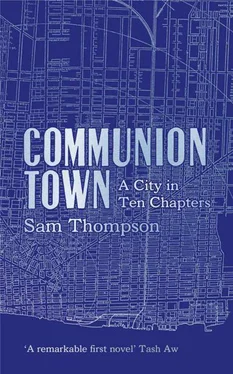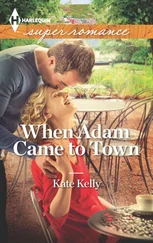It was only after the first shock of recognition had made me straighten up and take a step or two away from the parapet that I realised what I had seen. She was approaching across the bridge. I didn’t know what she was doing in this part of town so early on a weekday afternoon. If it was for work she hadn’t mentioned it. I hesitated. My first instinct had been to hide, not to let her know I was out wandering around when I should be in the flat working on my songs. But that was ridiculous: no one had said I was supposed to stay indoors all the time. I began to walk along the boardwalk so I’d catch up with her as she stepped off the bridge.
But before I got close enough, someone else moved forward to meet her, a tall chestnut-haired figure. They embraced, and kissed on the cheeks three times. It was Leo. He was dressed more smartly than before, in a dark overcoat, but he carried himself with the same outdoorsman’s self-possession. I could easily have waved, called out and joined them, declaring a happy coincidence, but I held back. I couldn’t have told you why, but I dropped behind one of the signboards that showed maps of the waterfront and watched as she slipped her arm into his. As they walked off together, I followed.
They left the Old Quarter and walked south along the quays. I kept them in sight all the way down the promenade, where coloured flags hung between the lamp posts and the daytrippers were busy using up the last of summer, and into the emptier streets of an unfamiliar part of town, a suburb where the breeze had an abrasive edge and stank faintly of diesel. I had always thought of this as a city which turned its back to the sea, but here each corner gave another angle from which to look down into the bay. I saw places where the bricks ran out, so that you could have climbed down to pebbles, bladderwrack and sea-wet sand. Beyond the grey water the factory chimneys were merging with the sky. The well-dressed pair continued ahead of me, passing bleak little bakeries and guesthouses, all shut, and I followed, hanging back until they were almost out of sight, hurrying forward to the next doorway in which I could conceal myself. Had they been paying much attention to their surroundings they would have noticed me, no doubt, but they were absorbed in their conversation.
We came to a cul-de-sac of terraced houses. I watched from the corner as they walked to the end of the row. They had run out of talk now; there was something sad, even hopeless, in the way she leant on his arm. The yard was overgrown in front of the last house and the upstairs windows were boarded over. She searched in her bag, produced the big, messy bunch of keys she always carried, and opened the front door. Leo placed a hand between her shoulders and followed her into the house.
I lingered a while at the end of the street, trying to work out what it was that I had seen. Then, automatically, I retraced my steps until I was home.
The image of that house, with its tangled yard and defaced exterior, lay on my mind like a sheet of glass for the rest of the day, suppressing other thoughts. When she arrived home I greeted her with a kiss, gave her dinner, listened to her day at work and spoke to her in reply, but I didn’t have a clue what either of us was saying.
That night I lay awake until she was breathing regularly, then I got up and dressed in the dark. I went through her bag and took her keys. As softly as I could, I let myself out of the flat and set off into the city. It was well past midnight, quiet, few people around. All noises had retreated. The night seemed to have its own resonance. At that hour, the city’s a gong that was struck at noon and is not yet quite still.
There were no signs of habitation when I reached the house. Half the streetlamps on the cul-de-sac were dead. Her key-ring held several keys I didn’t recognise, but it didn’t take me long to find the one that fitted the lock. Without knowing what I expected to find, I opened the door.
As soon as I stepped into the hallway, I was swamped by a sense of déjà vu so disorienting that I came to a halt on the threshold and had to force myself to carry on. I couldn’t shake the illusion I had been here. I groped along the wall for a switch, and a bare bulb came feebly alight overhead. For a minute or two I forgot all about her and Leo.
The house was crammed from top to bottom with what looked like junk, or the debris of a lifetime’s work on some questionable, arcane project. To enter the downstairs room you had to thread your way through a maze of wooden and cardboard crates, disordered bookshelves, chests of drawers and filing cabinets. Two large workbenches stood buried beneath stacks of manila folders and loose papers, antiquated computer equipment and boxes of tools. One of the benches was strewn with retort stands, stained, odd-shaped glassware and microscopes of various sizes. A fat reference book was held open by a tool-roll of black cloth, weighted with slender steel instruments: scissors, forceps, scalpels. I picked up a brass baton with a small glass eye at one end. It all reminded me of something, but I couldn’t think what. I paused and listened. Nothing was moving in the house. The night murmured away outside.
Upstairs, the smaller of the two rooms was completely empty. It had no window, only blind bulging plaster, featureless except for an iron ring bolted at waist-height into one wall. The dark-blotched floorboards had not been swept for a long time. There was nothing remarkable about the room, but just like the bookshelves and the equipment downstairs, like the damp smell of the hall, the looseness of the stair carpet and the sticky-greasy feel of the bannister, the empty room produced a peculiar mixture of emotions in me. It felt like the time I had left my songwriting notebook lying open on the kitchen table, and had come back to find one of her flatmates idly turning the pages. As I closed the door again, I noticed the heavy bolt on the outside.
The last room showed signs of more recent use. It was a chaos of papers, but the workbench was clear except for a cuboid metal filing box, and a monitor hooked up to an obsolete-looking electronic console. A spot lamp craned over the desktop and an office chair stood as though it had just been vacated. Three of the walls were lined with shelves filled with more metal boxes, all of them identical, each one displaying a small handwritten label. But against the fourth wall stood an upright piano. A window in its front showed a spool of paper punctured with a complex pattern of holes: it was a pianola, I realised, a player piano. I tried pressing on one of the treadles, but nothing happened. Then I saw the bundle of wires that protruded from the lid and trailed across the floor into the console machine on the workbench.
At this, the feeling of déjà vu returned, redoubled. This room too was familiar, but as it would be familiar to hold your own polished skull in your hands. My eyes moved to the metal boxes on their shelves, and to the labels on their sides. Written on each label was a person’s name. None that I recognised. They were in alphabetical order. I searched along the shelves … but the one I was looking for wasn’t there. I broke the silence by laughing at myself. Why in the world would it be? Nothing but a gap on the shelf. I looked again at the box on the desk, and felt my face drain. Sinking into the chair, I leant closer to make sure. My name was on the label.
I glanced at the door behind me, undid the catches of the box and lifted the lid.
Most of the space inside was taken up by a thick, scuffed hardback binder with my name on the spine. I opened it and began to leaf through pages of closely printed text. It looked old — the pages, thin, low-grade computer printout, were faded, dog-eared and soft at the edges. As I tried to make sense of the contents, I became calm, giving myself up entirely to that sense of uncanny reiteration, because now I knew that I was dreaming or mad. It was an impossible book. I could not bring myself to read more than a few words at a time. ‘ Later I strummed my guitar … ’ Wincing inwardly, I thumbed back and forth through the pages. ‘ … Without looking at her, I walked out … ’ I felt dizzy with embarrassment. ‘ The first time we met, she was climbing into a rickshaw. It was a bitter night … ’ I tore my eyes from the page. Of course, I had never written any kind of autobiography — I had never even kept a diary, never thought of it — but still I recognised the words right away. There was no accounting for it and no denying that they were mine. I slapped the binder shut, mortified.
Читать дальше
Конец ознакомительного отрывка
Купить книгу












